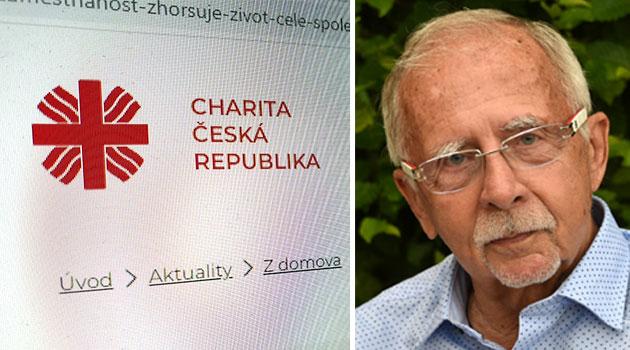Caritas Czech Republic distances itself from ombudsman's words about unemployed people: "Healthy white males" find work, but society is more diverse than that

Caritas Czech Republic rejects the recent statement by the current ombudsman, Stanislav Křeček, that “anyone who wants to find a job today will find one”. Caritas distances itself from that allegation and states that Křeček is repeating the popular myth of the “lazy unemployed”.
Simona Cigánková, spokeswoman for Caritas Czech Republic, informed the Romea.cz news server of the organization’s response to the allegations. Křeček has asserted that “… today, anyone who wants to find a job will find one.”
“If somebody doesn’t find [employment], that’s his problem, not the majority society’s,” the ombudsman said. He made the statement in an interview with the Seznam Zprávy news server during which he addressed the topic of excluded localities.
“In the context of the Caritas CARES report, published by Caritas Czech Republic last week, his statement is particularly paradoxical. That report, based on the experience of the Czech Republic’s largest provider of social services, summarizes a number of problems that people on the labor market face,” Caritas says in a press release.
“Those problems include the malfunction of the system through which the state should help with labor market access,” the press release states. “The ombudsman, who should be fundamentally dedicated to protecting rights, is instead communicating the repeatedly refuted but still popular myth of the ‘lazy unemployed’.”
“However, from its daily work with poor and unemployed people, Caritas knows this reality intimately, and it is quite different from Křeček’s myth,” adds the organization. “Yes, if a person is a ‘healthy, white man’, grew up in a good family, got an education, and faces no obstacles that would complicate his employment search, then he will certainly get a job.”
“Society is much more diverse than that, though. It includes people with various health restrictions, people who did not have family support as children and therefore completed only their basic education (or not), women who have spent years on parental leave and are not in demand on the labor market, or who have no child care because they cannot find a vacancy in the local nursery school,” Caritas explains.
“There are people who, because they are caregivers for children or elders, or for a family member who is incapacitated, cannot work the hours required by heavy industry and who, due to their educational attainment, will not find another kind of job in their place of residence. Older jobseekers are rejected by the labor market due to prejudice, fears of poor performance, or lack of digital skills,” the organization outlines.
“A huge group of unemployed is that of those indebted inviduals whom employers refuse to hire due to the administrative burden associated with deducting the amounts required to meet their collections obligations, or debtors who simply cannot afford to work formally, as they would be left with less income after these payroll deductions than if they never worked and received social benefits instead. At the same time, not all such people are solely themselves to blame for having fallen into the debt trap,” Caritas relates.
All kinds of people contact Caritas, which provides them with advice and various forms of support for finding employment. “However, even with the help of social workers, people frequently fail to find jobs,” the organization explains, adding that even if we were to set aside the fact that there are people who cannot find work for any reason even at this (at first glance ideal) time of minimal unemployment, it would still not be possible to say that this is just “those people’s problem” and not the problem of society.
“Unemployment and subsequent poverty have a number of negative effects,” emphasizes Lukáš Curylo, Director of Caritas Czech Republic. “Many studies point to the fact that poverty yields poor health (including mental health), lower educational attainment, and lower aspirations among poor families, which in turn leads to their generational transmission.”
“Crime rates risk rising as result. The inheritance of poverty is a topic that society simply cannot be indifferent to,” the director argues.
“To ignore poverty and unemployment with a simple wave of the hand, saying that this only affects a small number of people in the Czech Republic, means we will have to deal with much bigger problems in the future,” the Caritas press release warns. “That is why we believe it is necessary to stop repeating the mantra about the ‘lazy unemployed’ and to actively, effectively address the situation of people excluded from the labor market.”
“Our aid guide is contained in the Caritas CARES report mentioned above,” the press release concludes. “Caritas Czech Republic is, therefore, distancing itself from this difficult-to-understand belittling of the hard situation on the labor market in the Czech Republic.”
“It is worth considering the fact that these views are being voiced by a figure who is meant to be the personification of the fight against injustice and discrimination. Such obvious lies are highly harmful to society and distort its perception of the plight of those who have been rejected by the labor market here for a long time,” said Caritas Czech Republic in its press release.
